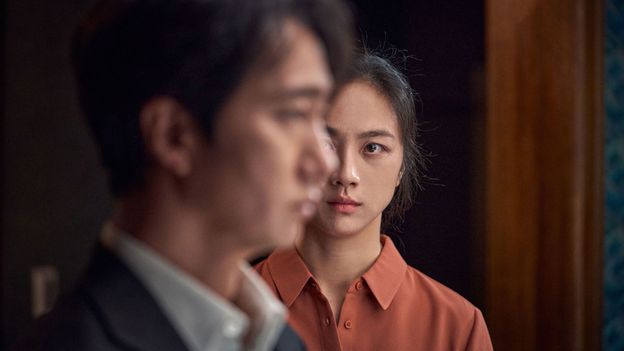Four stars for Decision to Leave


Stand back, James Stewart. You too, Michael Douglas. There’s a new lovestruck detective in town, and he can fixate on crimes, chase bad guys up staircases and make crucial mistakes with the best of them. The man to thank is Park Chan-wook. Six years after The Handmaiden premiered at Cannes, the Korean director is back at the festival with Decision to Leave, a neo-noir mystery in the tradition of Vertigo and Basic Instinct. He updates the typical cop-meets-femme-fatale scenario with smart watches, Google Translate and various nifty gadgets: I was especially fond of the chainmail glove the detective uses to defend himself from an assailant’s knife. Park also freshens up the genre with a host of imaginative shots, intricate edits and fantasy sequences, and he playfully parodies and subverts its tropes. But essentially Park and his co-writer Chung Seo-kyung have made a cracking post-Hitchcock romantic thriller with everything that requires, from intimate interrogations to rooftop chases to people standing on clifftops as the waves crash on the beach below.
More like this:
– The grossest film of 2022?
– Elba and Swinton fantasy: Three stars
– Top Gun 2 is ‘better than the original’
The film’s hero is Hae-joon (Park Hae-il), the youngest inspector in Busan’s police department. At weekends, this assiduous, upstanding policeman lives in a misty coastal town with his loving wife, but on weekdays in the city he is so devoted to his job that he goes on stakeouts every night instead of sleeping, and he has several identical tailor-made suits so he never has to think about what to wear. The trouble starts when a climber’s body is found at the base of a steep rocky mountain. After a wacky episode in which Hae-joon and his deputy use a motorised pulley to walk straight up the mountain’s sheer side, like Batman and Robin in the 1960s TV show, they wonder if the dead man fell or if he was pushed. The prime suspect is the man’s widow, Seo-rae (Tang Wei), a beautiful Chinese immigrant who doesn’t seem at all upset by his death. But, notes Hae-joo, Seo-rae is a care-giver who is adored by her elderly clients. She couldn’t possibly have committed murder, could she?
The investigation is exquisitely constructed, with a stream of revelations, some pulse-pounding action and continuous glimmers of wry humour. It’s also a model of elegance and restraint. There is nothing in Decision to Leave as brutal as Old Boy, and nothing as torrid as The Handmaiden. The best way to define it could be as an erotic thriller with the eroticism dialled down. There is one winking hint at the genre’s time-honoured steaminess, when Seo-rae pulls up her skirt to show Hae-joon some scratches on her leg, but otherwise the two remain fully dressed and chaste at all times. It could be love rather than lust which is clouding the detective’s judgement, and that makes the situation both more dangerous and more touching.
Decision to Leave
Directed by: Park Chan-wook
Starring: Tang Wei, Park Hei-il
Length: 138 minutes
Language: Korean, Chinese
Production company: Moho Film, CJ ENM
Still, Park was never going to be content with a slick genre movie, even one as enjoyable as this one. Just when the plot seems to be wrapping up, and the running time is approaching that of a standard film, the timeline jumps ahead a year, and a new mystery unfolds in a new setting. New characters are added to the cast, but old characters return, as Hae-joon comes to realise that his decision to leave his previous life might not have been his to make.
This disruptive structure isn’t exactly a departure for Park: The Handmaiden told the same story three times from three perspectives. The sudden time jump isn’t unheard-of in the genre, either. Hitchcock’s Vertigo, among other comparable films, stops and then starts again. But the device doesn’t work so well here. The first part of Decision to Leave is just too satisfying on its own, and the second part is just too separate, for them to complement each other. We don’t learn anything more about the characters, and our understanding of their earlier behaviour doesn’t really change. We’re basically watching an extended coda, a closing chapter that is almost as long as the rest of the book. As the plot thickens and the twists multiply, the viewer’s interest may begin to wane.
I shouldn’t complain, though, because by then Park has given us our money’s worth and more. Decision to Leave is a gleaming treat for anyone who likes to see policemen being bamboozled and befuddled by enigmatic women. If it isn’t quite as entertaining as his best films, it still beats the best films of most other directors.
★★★★☆
Decision to Leave premiered at the Cannes Film Festival.
Love film and TV? Join BBC Culture Film and TV Club on Facebook, a community for cinephiles all over the world.
If you would like to comment on this story or anything else you have seen on BBC Culture, head over to our Facebook page or message us on Twitter.
And if you liked this story, sign up for the weekly bbc.com features newsletter, called The Essential List. A handpicked selection of stories from BBC Future, Culture, Worklife and Travel, delivered to your inbox every Friday.








